Search
Did you mean: Hatti?
Remove Ads
Advertisement
Summary 
Loading AI-generated summary based on World History Encyclopedia articles ...
Search Results
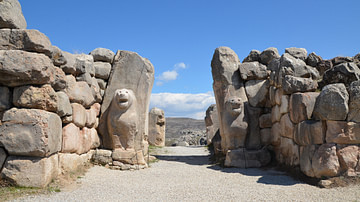
Definition
The Hittites
The Hittites occupied the ancient region of Anatolia (also known as Asia Minor, modern-day Turkey) prior to 1700 BCE, developed a culture apparently from the indigenous Hatti (and possibly the Hurrian) people, and expanded their territories...
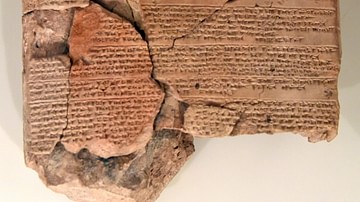
Teaching Material
Hittite Diplomacy & the Treaty of Kadesh
This lesson plan will allow students to answer the following questions: Who were the Hittites and how did they impact the Ancient Near East? What lessons can be learned from the Treaty of Kadesh about the importance of diplomacy in resolving...
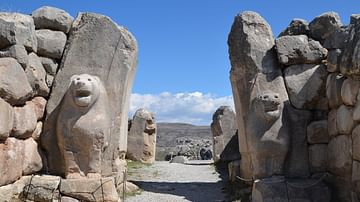
Article
Five Key Historical Sites of the Hittites
Although mentioned several times in the Biblical texts, the actual existence of the Hittites was largely forgotten until the late 19th century CE. With the discovery of Hattusa in 1834 CE, the city that was for many years the capital of the...
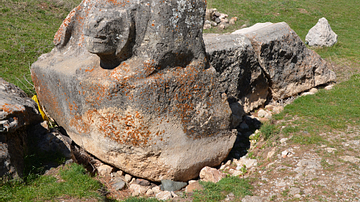
Image
Hittite Lion Tub at Hattusa
A Hittite Lion Tub lying among the ruins of the Great Temple at Hattusa, the capital of the Hittite Empire. The basin was originally 5.5 metres long, and featured crouching lions at all four corners. It probably had a role in cult rituals.
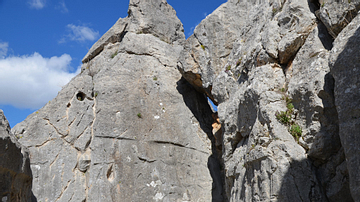
Image
Hittite Rock Reliefs at Yazilikaya
Hittite rock reliefs in Chamber A of the Yazilikaya Hittite Sanctuary (13th century BCE). On the left wall, the relief depicts the meeting between Teshub, the Hurrian god of sky and storm, and Hepat, the mother goddess of the Hurrians. On...

Image
Hittite Version of Kadesh Treaty
This is the Hittite version of the so-called "Kadesh Treaty" (also called the Silver Treaty or the Eternal Treaty). It was an Egyptian-Hittite peace treaty. Only three tablets of this Treaty were found in the Hittite capital, Hattusa, among...
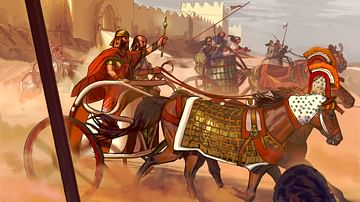
Image
Hittite War Chariots
Artist's impression of ancient Hittite war chariots leaving a Hittite city for battle. The Hittites were present in Anatolia from around 1700 to 1200 BCE. Created by Amplitude Studios for the video game Humankind.
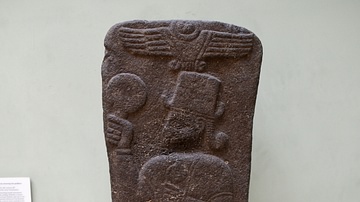
Image
Hittite Basalt Stela Showing Goddess Kubaba
The upper part is a freestanding basalt monument depicting the goddess Kubaba, consort of the storm god Teshub, and one of the most important deities at Carchemish. She holds a mirror and pomegranate, symbols of magic and fertility. Neo-Hittite...
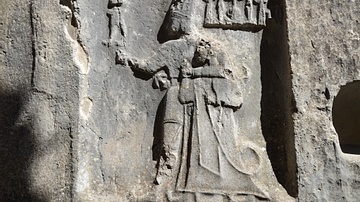
Image
Hittite relief of the God Sharruma and King Tudhaliya
East wall of Chamber B of the Yazilikaya Hittite Rock Sanctuary near Hattusa (13th century BCE) depicting in a niche the God Sharruma (the Hurrian Mountain God and son of the Thunder God Teshub) embracing Great King Tudhaliya IV (r. c. 1237–1209...
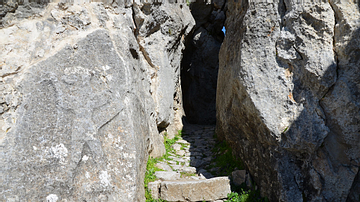
Image
Hittite relief of a Winged Lion-Headed Demon at Yazilikaya
Entrance to Chamber B of the Yazilikaya Hittite Rock Sanctuary near Hattusa (13th century BCE) with a relief of a winged, lion-headed demon.